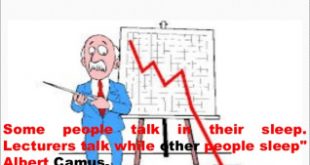from Dean Baker The indictments last week of a number of prominent people for paying bribes to get their children into elite colleges was perhaps more amusing than shocking. The fact that rich people are often able to buy their kids into schools is hardly a secret. After all, who believes that Donald Trump would have been accepted at the University of Pennsylvania, or his son-in-law Jared Kushner would have been attending Harvard, had it not been for their wealthy fathers? We also know...
Read More »Economism
from Richard Norgaard We live in the era of Economism. Human consciousness is deeply etched by economistic beliefs in individualism, materialism, property, markets, economic growth, and freedom as consumer choice. These beliefs are necessary to sustain the system that supports us. But the economy we have is unlikely to support our grandchildren. Natural scientists argue that we are in a new geologic era, the Anthropocene, where people have become the major force in changing the geosphere:...
Read More »Certain decisions
from Peter Radford One of the books I keep close by on the shelf is Paul Glimcher’s “Decisions, Uncertainty, and the Brain: The Science of Neuroeconomics”. It dates back to 2004 and is one of those books that provides a glimpse of what a dialog between economic theory and psychology might produce. More to the point it explores the issues surrounding economic decision making at a deep biological level. It thus adds substantially to the behavioral explanation of economic activity. Apart...
Read More »Public debt — questions and answers
from Lars Syll Can a government go bankrupt? No. You cannot be indebted to yourself. Can a central bank go bankrupt? No. A central bank can in principle always ‘print’ more money. Do taxpayers have to repay government debts? No, at least not as long the debt is incurred in a country’s own currency. Do increased public debts burden future generations? No, not necessarily. It depends on what the debt is used for. Does maintaining full employment mean the government has to increase its...
Read More »Switching track
from Peter McManners Economics has evolved over the last two centuries, from Adam Smith’s ideas to expand into a colossus which is now the dominant driver of policy. This has set the world on a track of extraordinary success, as measured by GDP and wealth. Continuing down this track, defined by economic objectives, leads to levels of consumption beyond our dreams and beyond the capacity of the planet. Success today comes at the price of downfall in the future, as “economic civilisation”...
Read More »The neoliberal governance of the self: a clarification
from Maria Alejandra Madi My last post on Behavioural Economics arose some interesting questions about the rationality of the neoliberal governance of the self and its relation to the current research about psychology and cognitive theories. (https://rwer.wordpress.com/2019/03/20/beyond-behavioral-economics-the-self-governance-of-nudging/#comment-150149) The neoliberal governance of self-care (or neoliberal governance of the self) relies on Dual Process Cognitive Theories (DPTs),...
Read More »Why Minsky matters
from Asad Zaman Why did No One See It Coming? We start by posing the question “Why did no one see it coming?” which the Queen of England asked at the London School of Economics. To answer, we must consider the evolution of macroeconomic thought. This involves the rejection of Keynes, the rise of monetarism of Friedman, the extremism of Lucas, New Monetary Consensus of Bernanke, Efficient Markets of Fama, Laissez-Faire approach to financial regulation. The book starts with a beautiful...
Read More »The inconsistencies of intellectual property
from Herman Daly Of all things knowledge is that which should be most freely shared, because in sharing it is multiplied rather than divided. Knowledge is a non-rival good and should be also non excludable. Yet, as already noted, our trade theorists have rejected Thomas Jefferson’s dictum that “Knowledge is the common property of mankind” in exchange for a muddled doctrine of “trade related intellectual property rights” by which they are willing to grant private corporations monopoly...
Read More »How to teach economics if you have a dissenting perspective
from Lars Syll Issue #1: How do you teach the introductory economics courses if you have a dissenting perspective? Mankiw lays out three alternatives, teaching the mainstream and suppressing your own views, teaching minority or fringe views (i.e. your own), or not teaching introductory econ at all. He says the second option is “pedagogical malpractice” … I opted for an approach neither of them consider, to present mainstream economics in the third person: this is what that particular...
Read More »The logic of artificial scarcity at work
from Jason Hickel We can also see the logic of artificial scarcity at work in the realm of consumption. Industrialists who fear that people’s existing needs are too limited to absorb capitalism’s immense productive output must seek to create new needs, or else the juggernaut will grind to a halt. This is accomplished by various means. One is to expand desires through sophisticated advertising campaigns – and to extend these campaigns into all public and private spaces – manipulating...
Read More » Real-World Economics Review
Real-World Economics Review


